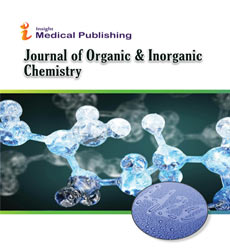Synthetic Organic Chemistry: Applications in Drug Discovery, Materials Science
Leonard Wick
Department of Chemistry, University of North Carolina, Chapel Hill, USA
Published Date: 2024-06-06DOI10.36648/2472-1123.10.2.78
Leonard Wick*
Department of Chemistry, University of North Carolina, Chapel Hill, USA
- *Corresponding Author:
- Leonard Wick
Department of Chemistry, University of North Carolina, Chapel Hill,
USA,
E-mail: pinnyleon@unc.edu
Received date: May 06, 2024, Manuscript No. IPJOIC-24-19264; Editor assigned date: May 08, 2024, PreQC No. IPJOIC-24-19264 (PQ); Reviewed date: May 22, 2024, QC No. IPJOIC-24-19264; Revised date: May 29, 2024, Manuscript No. IPJOIC-24-19264 (R); Published date: June 06, 2024, DOI: 10.36648/2472-1123.10.2.78
Citation: Wick L (2024) Synthetic Organic Chemistry: Applications in Drug Discovery, Materials Science. J Org Inorg Chem Vol.10 No.2: 78.
Description
Synthetic organic chemistry is a branch of chemistry focused on the design, synthesis and study of organic compounds through various chemical reactions. It plays a pivotal role in creating new materials, pharmaceuticals, agrochemicals and functional molecules essential for numerous industries and scientific advancements. This field combines creativity with precision, aiming to develop efficient synthetic routes that enable the production of complex molecules from simple starting materials. Organic chemists manipulate functional groups through chemical reactions to modify molecular properties and create diverse compounds. Common reactions include oxidation, reduction, addition, elimination and substitution. This strategic approach involves planning a synthesis pathway by deconstructing the target molecule into simpler intermediates. Chemists then identify suitable starting materials and plan synthetic steps backwards to achieve the desired structure. Complex molecules often require protection of reactive functional groups to prevent unwanted reactions during synthesis. Protecting groups are selectively removable groups that shield specific functional groups temporarily, facilitating stepwise synthesis. Controlling the three-dimensional arrangement of atoms is vital for the biological activity and physical properties of organic molecules. Synthetic methods often aim to selectively produce specific stereoisomers to achieve desired properties.
Drug discovery
Drug discovery and development heavily rely on synthetic organic chemistry to create bioactive compounds. Medicinal chemists design and synthesize potential drug candidates, optimizing their efficacy, safety and pharmacokinetic properties through structure-activity relationship studies. Organic chemists contribute to the development of advanced materials such as polymers, dyes and coatings. Functional polymers with tailored properties, including conductivity, biodegradability and mechanical strength, are synthesized to meet specific industrial and consumer needs. Pesticides, herbicides and fertilizers are synthesized using organic chemistry principles to enhance crop protection and agricultural productivity. Green chemistry approaches in agrochemical synthesis aim to minimize environmental impact while maintaining efficacy. Specialty chemicals used in cosmetics, flavors, fragrances and electronic materials are synthesized through precise organic chemistry methodologies. These chemicals often require high purity and tailored functional groups for specific applications. Organic synthesis supports biotechnological innovations, including enzyme mimics, bioconjugates and biomaterials. These applications bridge organic chemistry with biological systems, enabling novel therapeutic and diagnostic tools. Transition metal catalysts enable selective and efficient bond formations in organic synthesis. Catalytic reactions minimize waste and improve reaction efficiency, driving sustainable chemical processes.
Chemists develop strategies
Chemists develop strategies to control chemical reactions to selectively form desired bonds at specific sites within a molecule and in specific stereoisomeric forms. Continuous exploration and development of new reactions expand synthetic capabilities. Modern organic synthesis includes innovative reactions such as cross-coupling, C-H activation and asymmetric synthesis, enabling access to previously inaccessible chemical structures. Robotics and automation accelerate reaction optimization and library synthesis in drug discovery and materials science. High-throughput techniques enable rapid screening of reaction conditions and compound libraries, facilitating discovery and development processes. Synthesizing complex natural products and drug candidates requires efficient synthetic routes and advanced methodologies. Chemists continue to develop strategies to streamline synthesis and improve yield and purity. Green chemistry principles are increasingly integrated into synthetic organic chemistry to minimize waste, reduce solvent use and optimize energy efficiency. Developing sustainable synthetic methodologies remains a priority. Achieving precise control over reaction outcomes, including stereochemistry and functional group compatibility, remains a critical challenge. New catalysts and reaction conditions are continually sought to enhance selectivity and efficiency. Collaboration between organic chemists, computational chemists, biologists and materials scientists enhances at the interface of chemistry and other disciplines. Integrated approaches drive discoveries in drug discovery, materials design and biotechnology. Synthetic organic chemistry stands as a cornerstone of modern science and technology, driving innovation in pharmaceuticals, materials science, agrochemicals and beyond. By continually advancing synthetic methodologies and embracing interdisciplinary collaboration, organic chemists contribute to solving global challenges and improving quality of life. The field's evolution towards sustainable practices underscores its commitment to environmental stewardship and societal benefit. In summary, synthetic organic chemistry empowers scientists to design and create molecules that shape our world, offering endless possibilities for discovery and application.
Open Access Journals
- Aquaculture & Veterinary Science
- Chemistry & Chemical Sciences
- Clinical Sciences
- Engineering
- General Science
- Genetics & Molecular Biology
- Health Care & Nursing
- Immunology & Microbiology
- Materials Science
- Mathematics & Physics
- Medical Sciences
- Neurology & Psychiatry
- Oncology & Cancer Science
- Pharmaceutical Sciences
